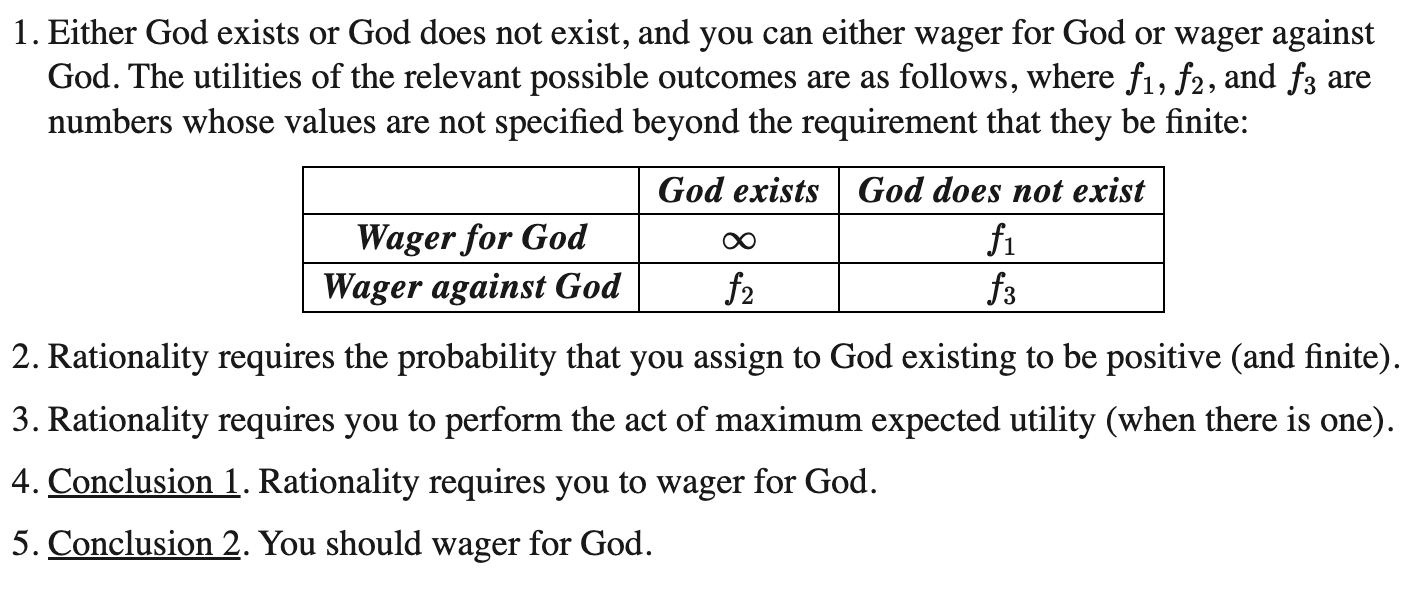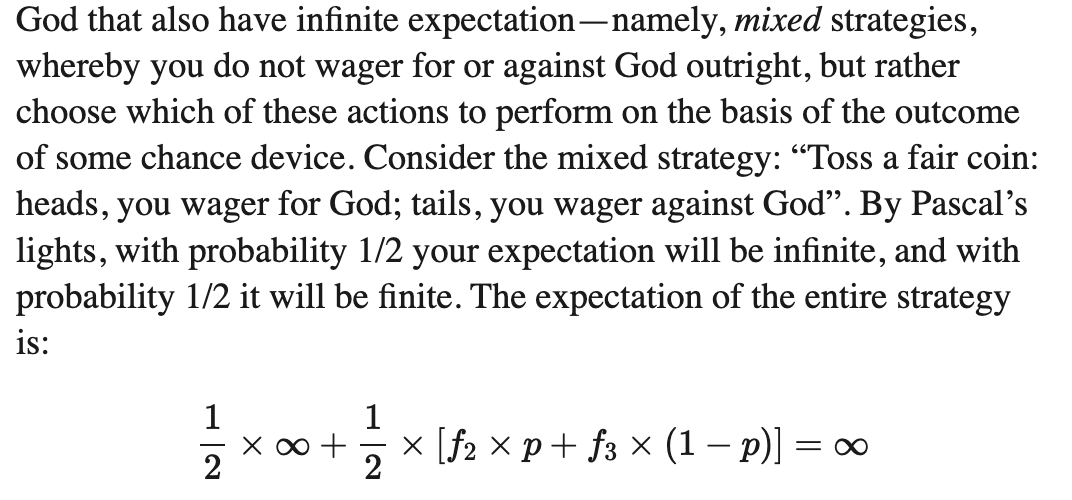01 Decision Theory Background
01.01 Decisions Under Uncertainty
Actions in decisions under uncertainty (no probabilities), ( A_1 ) superdominates ( A_2 ) iff all outcomes of ( A_1 ) are not worse than ( A_2 ) and at least one outcome is better
Superdominate seems like a good term for value theory.
01.02 Decisions Under Risk
Actions in decisions under risk (probabilities), choose the one with maximum expected utility.
02 The Wager
Original Pascal Quote
”God is, or He is not.” But to which side shall we incline? Reason can decide nothing here. There is an infinite chaos which separated us. A game is being played at the extremity of this infinite distance where heads or tails will turn up… Which will you choose then? Let us see. Since you must choose, let us see which interests you least. You have two things to lose, the true and the good; and two things to stake, your reason and your will, your knowledge and your happiness; and your nature has two things to shun, error and misery. Your reason is no more shocked in choosing one rather than the other, since you must of necessity choose… But your happiness? Let us weigh the gain and the loss in wagering that God is… If you gain, you gain all; if you lose, you lose nothing. Wager, then, without hesitation that He is.

Not going to explain this because I already understand it.
Okay they are really going into depth in this article about exactly what Pascal wrote and how he interpreted it instead of going into the argument and everything else.
Pascal might have been the first to come up with Expected Utility Theory (you should take the action that maximized expected utility)


Different claim says that wagering against god is finite because of God’s mercy ie: Sobel— alright. (“The justice of God must be vast like His compassion. Now justice to the outcast is less vast … than mercy towards the elect”)
03 Objections to the Wager
03.01 Decision Table Objections (Premise 1)
- Different Decision Tables for Different People
- Utility of Salvation could not be infinite (see A global bounded utility function is necessary)
- More than one infinity in the table (ex: reincarnation to infinity for f1 or f3, diverging to positive or negative infinity)
- Table should have more rows (ex: must be able to reason from evidence)
- The many Gods objection (more columns) — Can all cancel out. If you start assigning probabilities, then the infinities are still infinities and can still cancel each other out. (Talks in depth about this more but I honestly don’t think it adds anything meaningful)
03.02 Probability Objections (Premise 2)
- Probability for God is undefined (BS imo)
- Probability for God is ( 0 ) (BS imo)
03.03 Expected Utility Objections (Premise 3)
- St. Petersburg paradox problem (finite amount to play a game with infinite expectation)
- Some other notes that I don’t think particularly add anything
03.04 Argument Validity Issues

- A mixed strategy also yield infinite outcome! Ie: based on some random outcome, choose your action.
- Including ignoring the wager and having a hamburger is kind of its own mixed strategy because you still might believe in God later with non-zero probability
- Argument of a repeated game where you have multiple chances to believe in God. Eventually it will come out to true. But this isn’t necessarily true either, ex: rolling a ( (n+1)^2 ) sided die on the nth trial still leads to a ( 1/2 ) chance. But then argument that if this can be taken instantly, then you continue doing the repeated game. It gets annoying but they eventually argue you should ignore this and just go to the original wager.
- Pascal’s revenge — If there is a negative infinity somewhere, then you get inf - inf which is undefined. (Hajek), didn’t fully understand. Basically just saying “this creates indeterminacy”
03.05 Moral Objections
- If you do not believe in God and try to believe in God, Pascal mentions this may corrupt you.
- (or threaten society not believing in things fully proven)
- Or say that God’s punitive divine plan is immoral so it is just to rebel against it
- Or Voltaire claiming wagering with God is childish (but you still have to make a decision)
03.06 Psychological Feasibility
- May or may not be possible to change belief
- Could also make different decisions on this at different times.
04 Modern Extensions
If you claim that living a life believing in God, it is strictly better (ie: “superduperdominant” as Hajek calls it LMAO). So you should believe even if God is impossible.
Pascal’s Wager has had massive impact on many lines of thought — infinity, probability, decision theory, epistemology, psychology, and morality. Various Pascal Wager like scenarios.
Bruh wtf is surreal decision theory. Paper link here
05 Conclusion
It seems like either value pluralism or bounded utility functions must be true (or both).